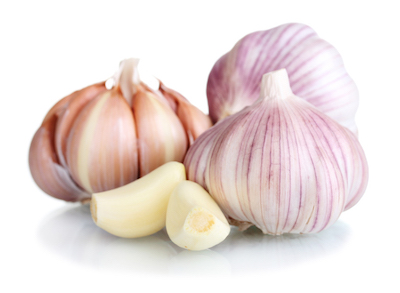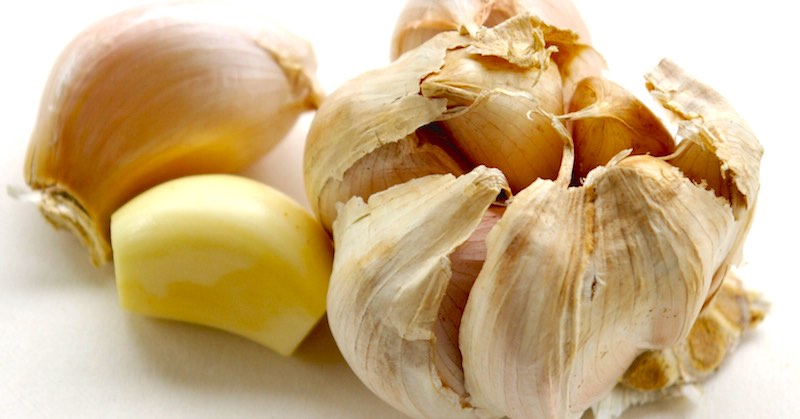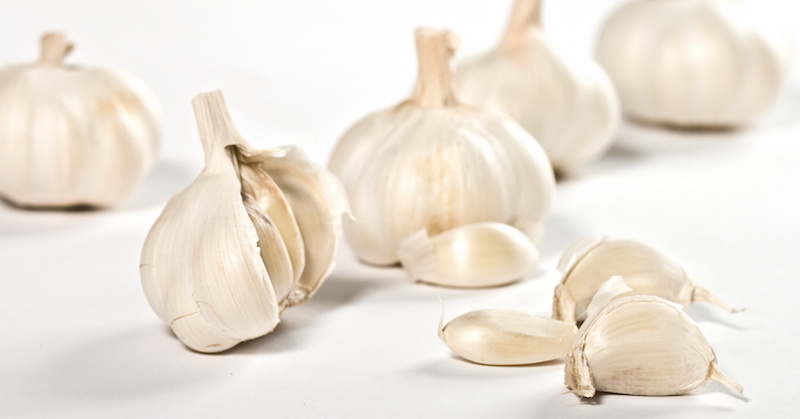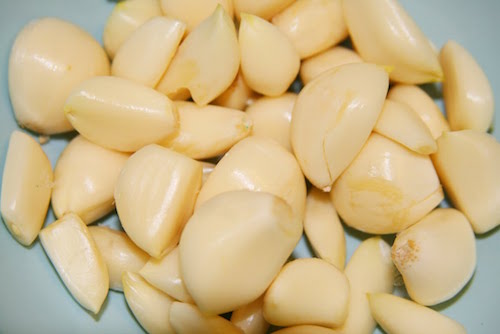Antimicrobial Health Benefits of Garlic Wipe Out Disease-Causing Microbes In The Body
Last updated on
Garlic is cultivated and widely used in almost every culture in the world for its myriad medicinal values.
The garlic bulb is composed of individual cloves enclosed in a white parchment-like skin. A bulb of garlic generally measures about two inches in height and two inches across in a teardrop shape.
Garlic is commonly used in most Chinese cooking, not only to enhance the flavor of foods, but also for its wonderful and endless health benefits.
Nutritional Benefits Of Garlic
Garlic is an excellent source of vitamins A, B-complex and C. It provides a good supply of minerals like manganese, phosphorus, calcium, copper, potassium, iron and copper.
It also contains amino acids, essential oils, glycosides, and the rare essential trace minerals like germanium, selenium and tellurium.
The phytochemical in garlic includes antioxidant allium, which is also present in onions, leeks, chives and shallots.
Garlic amazingly contains more than 12 types of known antioxidants. Is it any wonder that it has numerous healing virtues?
This is one of the few superfoods that doesn’t lose its medicinal properties with cooking. However, garlic in its raw state has its other benefits too.
Powerful Antimicrobial Effects of Garlic
A major health benefit of garlic is its powerful antimicrobial properties that are able to kill disease-causing microbes.
We live in a world with millions of microbe species, and having potent antimicrobial foods such as garlic, is a great help to fight what cannot be seen with our naked eyes.
Garlic has antibacterial properties
Historically, it is believed that Louis Pasteur described the antibacterial effect of garlic in 1858 for the first time, although no reference is available.
More recently, garlic has been proven to be effective against a plethora of gram-positive, gram-negative, and acid-fast bacteria. These include:
- Salmonella
- Escherichia coli
- Micrococcus
- Bacillus subtulis
- Mycobacterium
- Helicobacter pylori
It was documented that garlic when fighting bacterial infections is able to differentiate between beneficial intestinal microbes and potentially harmful bacteria.
Garlic has antiparasitical properties
Several studies have shown that garlic extract was effective against a host of protozoa including:
- Candida albicans
- Giardia lamblia
- Entamoeba histolytica
- Tinea pedis
- Trichinella spiralis
Due to the occurrence of unpleasant side effects and increasing resistance to the synthetic pharmaceuticals, garlic was recommended for the treatment of giardiasis.
Inhibitory activity of garlic on giardia was encouraging, thus garlic was established as an antiparasite.
It was successful in removing the symptoms from all patients within 24 hours, and completely removing any indication of giardisis from the stool within 72 hours, using commercially-prepared garlic capsules.
Garlic has antifungal properties
Many fungi are sensitive to garlic, including Candida, Torulopsis, Trichophyton, Cryptococcus and Aspergillus. Garlic extracts have been shown to decrease the oxygen uptake of the fungi and reducing their growth.
In the presence of garlic extract, it was found that adhesion of Candida is also greatly reduced, making it easier for them to be eliminated when doing any detoxification protocol.
Aged garlic extract, when given to infected mice, the number of organisms were seen to reduce by up to 80%.
Garlic has antiviral properties
A few in vitro studies were done against these viruses, that were proven to be effective:
- Influenze A and B
- Rhinovirus
- HIV
- Herpes simplex virus 1 and 2
- Viral penumonia
- Rotavirus
One study showed that Allicin-containing supplements can prevent attacks by the common cold virus.
Garlic Strengthens Heart Health
Many experimental and clinical studies support the idea that garlic consumption have significant effects on various aspects that contribute to heart health:
- Lowering blood pressure
- Prevention of atherosclerosis
- Reduction of serum cholesterol and triglyceride
- Inhibition of platelet aggregation
- Prevention of thrombosis
Garlic lowers blood pressure
High blood pressure, or hypertension, is one of the most important drivers of heart diseases and strokes.
In an experiment, oral ingestion of garlic extract in hypertensive animals brought the blood pressure back to normal level.
Several clinical studies showed that garlic reduced blood pressure in more than 80% of patients suffering from high blood pressure.
In one trial, investigation on 47 hypertensive patients showed that garlic significantly decreased the mean systolic blood pressure by 12 mmHg, and the mean supine diastolic blood pressure by 9 mmHg versus placebo.
Supplement doses must be fairly high to have these desired effects. The amount of allicin needed is equivalent to about four cloves of garlic per day.
In all studies, no side effect and no serious complication was reported.
Garlic prevents atherosclerosis
Atherosclerosis is a condition where the arteries become narrowed and hardened due to a buildup of plaque around the artery walls. This condition disrupts the flow of blood around the body, posing risks of serious complications.
Preventive effect of garlic on atherosclerosis has been attributed to its capacity to reduce lipid content in arterial membrane. Allicin, present in garlic is the active compound responsible for the anti-atherosclerotic effect .
Garlic reduces serum cholesterol and triglyceride
In most human studies on lipid-lowering effects of garlic and garlic preparations, significantly reduced serum cholesterol, triglyceride and (“bad”) LDL were observed. However, there seems to be no effect on the HDL (“good”) cholesterol specifically.
In in vitro experiments, garlic administration suppressed LDL oxidation and moderately increased HDL, which may be one of the protective mechanisms of the beneficial effects of garlic in cardiovascular health
More importantly, garlic significantly reduces the oxidation of the blood cholesterol and the arterial deposits to lower the risks of heart diseases.
Garlic inhibits platelet aggregation, thus thrombosis
Several human studies have found that garlic increased fibrinolytic activity in healthy individuals as well as in acute myocardial infarction patients.
Garlic has also been shown to inhibit platelet adhesion or aggregation in human investigations.
These observations indicate that garlic may be beneficial in the prevention of thrombosis. Thrombosis, as we understand it in layman language means: blood clot formation inside a blood vessel that obstruct the flow of blood through the circulatory system.
When thrombosis occurs in a brain’s artery, it causes a stroke. When it occurs in a heart’s artery, it causes a heart attack.
Many Amazing Health Benefits Of Garlic
The health benefits of garlic revolve around its antimicrobial effect that efficiently combats bacteria, fungi, intestinal parasites, viruses, yeast, etc.
We now know that most of the health effects are caused by one of the sulfur compounds formed when a garlic clove is chopped, crushed or chewed.
This compound is known as allicin, and is also responsible for the distinct garlic smell.
Allicin enters the body from the digestive tract and travels all over the body, where it exerts its potent biological effects that neutralize the free radicals in the body.
Take two or three cloves daily to see its efficacy in a variety of disorders:
Has cancer-preventive and antitumor effects
Many studies have suggested possible cancer-preventive effects of garlic preparations. It has been found to contain a large number of potent bioactive compounds with anticancer properties.
Different garlic derivatives have been reported to affect molecular mechanisms in fighting free radicals, prevent cancer cells formation, mutation and proliferation.
The US National Cancer Institute recognizes that garlic may be the most potent food having cancer-preventive properties.
Garlic has antioxidative, antitumor effects, inhibits tumor cell growth and chemopreventive effects.
Related reading: Garlic kills 14 types of cancer and 13 different infections
High antioxidant activities to protect brain health
Oxidative damage from free radicals contributes to the aging process.
Garlic contains high antioxidants that support the body’s protective mechanisms against oxidative damage.
High doses of garlic supplementation have been shown to increase antioxidant enzymes in humans, as well as significantly reduce oxidative stress in those with high blood pressure.
The combined effects on reducing cholesterol and blood pressure, as well as the antioxidant properties, may help prevent common brain diseases like Alzheimer’s disease and dementia.
Detoxifies heavy metals from the body
At high doses, the sulfur compounds in garlic have been shown to protect against organ damage from heavy metal toxicity.
A four week study in employees of a car battery plant (excessive exposure to lead) found that garlic reduced lead levels in the blood by 19%. It also reduced many clinical signs of toxicity, including headaches and blood pressure.
Three doses of garlic each day even outperformed the drug D-penicillamine in symptom reduction.
Reduces blood glucose level in diabetes mellitus
Experimental studies demonstrated a clear hypoglycemic effect of garlic. Many studies showed that garlic can reduce blood glucose in diabetic animals.
The beneficial effect of garlic on diabetes mellitus is mainly attributed to the presence of volatile sulfur compounds, such as alliin, allicin, diallyl disulfide, diallyl trisulfide, diallyl sulfide, S-allyl cysteine, ajoene, and allyl mercaptan. Garlic extracts have been reported to be effective in reducing insulin resistance.
Protects the liver against drug-induced toxicity
Several studies showed that garlic can protect the liver cells from some toxic agents.
For example, overdose of acetaminophen is known to cause liver and kidney toxicity in humans. It was demonstrated that garlic protects against acetaminophen-induced liver toxicity.
Another drug-induced toxicity was being examined—gentamycin (or gentamicin). This drug is used for treating a variety of bacterial infections but found to induce liver damage, as revealed by elevation of liver damage marker enzymes (AST and ALT), and reduction in plasma albumin level.
Dietary inclusion of garlic powder protects the liver against this drug-induced toxicity by improving antioxidant status and modulating oxidative stress.
Beats common cold or shortens sick days
Garlic supplementation is known to boost the function of the immune system.
One large 12-week study found that a daily garlic supplement reduced the number of colds by 63% compared with placebo. The average length of cold symptoms was also reduced by 70%, from 5 days in placebo to just 1.5 days in the garlic group.
Another study found that a 2.56 grams/day dose of garlic extract can reduce the number of days sick with cold or flu by 61%.
If you tend to catch colds easily, then adding garlic to your diet could be incredibly helpful. Garlic acts as a medication for the cold, helps relieve congestion and aids in speedy recovery.
Consumption Tips
Eating raw garlic takes some getting used to. But understanding all the health benefits of garlic, try to include them in your daily diet. Sneak one or two cloves or garlic into the juicer when you juice your favorite juice recipe.
Special Tip!!
Before you go to bed at night, prepare this magic potion:
Half an hour after dinner, do this …
- Finely chop up two cloves of fresh garlic and let it expose to the air for a few minutes while you wash up your blender or chopping board. The chopping releases the enzyme alliinase in the garlic.
- Gather the chopped garlic in a spoon and swallow it with water.
- You may add a little raw honey if desired, which will give it more mileage as raw honey is a great anti-bacterial agent. Manuka honey can also be used, especially if you want to address a sinus issue or stop a cold or flu.
The garlic and honey will travel your entire digestive tract while you sleep and scavenge and neutralize all the toxins, carcinogens, harmful bacteria, fungi, viruses, foreign chemicals before they can harm your healthy cells.
The sulfur compounds in garlic will also detoxify your liver of blood toxins, lead and other heavy metals that will be flushed out the next day.
Swallowing the chopped garlic will not give you garlic breath, as long as you don’t chew it.
In the morning, drink a big glass of water with a squeeze of lemon juice. Your first bowel movement will have a strong garlic odor and you will know that the harmful stuff have been eliminated from your body. Try it!
Learn how to peel garlics in two seconds.
Cautionary Note
Garlic is a very potent medicinal herb. 2-4 raw cloves daily is sufficient for you to enjoy all the health benefits it has to offer. A little more when semi-cooked is fine.
Garlic has a blood-thinning effect, therefore, do not take it with other anti-coagulant drugs.
Avoid taking large quantities of garlic. Although rare, high doses of garlic may trigger some health problems for some individuals—causing anemia, weight loss, excessive gas, diarrhea or asthma.
It is safe to eat raw garlic at any time, but if eating raw garlic daily, do not eat on empty stomach as in the long-term it may be a little harsh on the stomach wall lining.
Some individuals may be intolerant to a compound in garlic called fructans. Should you experience abdominal pain, bloating or flatulence after eating raw garlic, this could be the reason.
Reference:
https://www.ncbi.nlm.nih.gov/pmc/articles/PMC3874089/
https://www.ncbi.nlm.nih.gov/pmc/articles/PMC4103721/
“Let food be thy medicine, and medicine be thy food.”
Those are famous words from the ancient Greek physician Hippocrates, often called the father of Western medicine.
He actually used to prescribe garlic to treat a variety of medical conditions.
Well… modern science has recently confirmed many of these beneficial health effects.
Here are 11 health benefits of garlic that are supported by human research studies.
1. Garlic Contains a Compound Called Allicin, Which Has Potent Medicinal Properties Garlic is a plant in the Allium (onion) family.
It is closely related to onions, shallots and leeks.
It grows in many parts of the world and is a popular ingredient in cooking due to its strong smell and delicious taste.
However, throughout ancient history, the main use of garlic was for its health and medicinal properties (1).
Its use was well documented by all the major civilizations… including the Egyptians, Babylonians, Greeks, Romans and the Chinese (2).
This is what garlic looks like:
The entire “head” is called a garlic bulb, while each segment is called a clove. There are about 10-20 cloves in a single bulb, give or take.
We now know that most of the health effects are caused by one of the sulfur compounds formed when a garlic clove is chopped, crushed or chewed.
This compound is known as allicin, and is also responsible for the distinct garlic smell.
Allicin enters the body from the digestive tract and travels all over the body, where it exerts its potent biological effects (which we’ll get to in a bit).
| Bottom Line: Garlic is a plant in the onion family, grown for its cooking properties and health effects. It is high in a sulfur compound called Allicin, which is believed to bring most of the health benefits. |
2. Garlic Is Highly Nutritious, But Has Very Few Calories
Calorie for calorie, garlic is incredibly nutritious.
A 1-ounce (28 grams) serving of garlic contains (3):
- Manganese: 23% of the RDA.
- Vitamin B6: 17% of the RDA.
- Vitamin C: 15% of the RDA.
- Selenium: 6% of the RDA.
- Fiber: 1 gram.
- Decent amounts of Calcium, Copper, Potassium, Phosphorus, Iron and Vitamin B1.
Garlic also contains trace amounts of various other nutrients. In fact, it contains a little bit of almost everything we need.
This is coming with 42 calories, with 1.8 grams of protein and 9 grams of carbs.
| Bottom Line: Garlic is low in calories and very rich in Vitamin C, Vitamin B6 and Manganese. It also contains trace amounts of various other nutrients. |
3. Garlic Can Combat Sickness, Including the Common Cold
Garlic supplementation is known to boost the function of the immune system.
One large 12-week study found that a daily garlic supplement reduced the number of colds by 63% compared with placebo (4).
The average length of cold symptoms was also reduced by 70%, from 5 days in placebo to just 1.5 days in the garlic group.
Another study found that a high dose of garlic extract (2.56 grams per day) can reduce the number of days sick with cold or flu by 61% (5).
If you often get colds, then adding garlic to your diet could be incredibly helpful.
| Bottom Line: Garlic supplementation helps to prevent and reduce the severity of common illnesses like the flu and common cold. |
4. The Active Compounds in Garlic Can Reduce Blood Pressure

High blood pressure, or hypertension, is one of the most important drivers of these diseases.
Human studies have found garlic supplementation to have a significant impact on reducing blood pressure in people with high blood pressure (6, 7, 8).
In one study, aged garlic extract at doses of 600-1,500 mg was just as effective as the drug Atenolol at reducing blood pressure over a 24 week period (9).
Supplement doses must be fairly high to have these desired effects. The amount of allicin needed is equivalent to about four cloves of garlic per day.
| Bottom Line: High doses of garlic appear to improve blood pressure of those with known high blood pressure (hypertension). In some instances, supplementation can be as effective as regular medications. |
5. Garlic Improves Cholesterol Levels, Which May Lower The Risk of Heart Disease
Garlic can lower Total and LDL cholesterol.
For those with high cholesterol, garlic supplementation appears to reduce total and/or LDL cholesterol by about 10-15% (10, 11, 12).
Looking at LDL (the “bad”) and HDL (the “good”) cholesterol specifically, garlic appears to lower LDL but has no reliable effect on HDL (13, 14, 15).
Garlic does not appear to lower triglyceride levels, another known risk factor for heart disease.
| Bottom Line: Garlic supplementation seems to reduce total and LDL cholesterol, particularly in those who have high cholesterol. HDL cholesterol and triglycerides do not seem to be affected. |
6. Garlic Contains Antioxidants That May Help Prevent Alzheimer’s Disease and Dementia
Oxidative damage from free radicals contributes to the ageing process.
Garlic contains antioxidants that support the body’s protective mechanisms against oxidative damage (16) .
High doses of garlic supplementation have been shown to increase antioxidant enzymes in humans (17), as well as significantly reduce oxidative stress in those with high blood pressure.
The combined effects on reducing cholesterol and blood pressure, as well as the antioxidant properties, may help prevent common brain diseases like Alzheimer’s disease and dementia (18).
| Bottom Line: Garlic contains antioxidants that protect against cell damage and ageing. It may reduce the risk of Alzheimer’s disease and dementia. |
7. Garlic May Help You Live Longer
Effects on longevity are basically impossible to prove in humans.
But given the beneficial effects on important risk factors like blood pressure, it makes sense that garlic could help you live longer.
The fact that it can fight infectious disease is also an important factor, because these are common causes of death, especially in the elderly or people with dysfunctional immune systems.
| Bottom Line: Garlic has known beneficial effects on common causes of chronic disease, so it makes perfect sense that it could help you live longer. |
8. Athletic Performance Can be Improved With Garlic Supplementation
Garlic was one of the earliest “performance enhancing” substances.
It was traditionally used in ancient cultures to reduce fatigue and enhance the work capacity of labourers.
Most notably, it was administered to Olympic athletes in ancient Greece (19).
Rodent studies have shown that garlic helps with exercise performance, but very few human studies have been done.
Subjects with heart disease that took garlic oil for 6 weeks had a reduction in peak heart rate of 12% and improved their exercise capacity (20).
However, a study on nine competitive cyclists found no performance benefits (21).
Other studies suggest that exercise-induced fatigue may be reduced with garlic.
| Bottom Line: Garlic can improve physical performance in lab animals and people with heart disease. Benefits in healthy people are not yet conclusive. |
9. Eating Garlic Can Help Detoxify Heavy Metals in the Body
At high doses, the sulfur compounds in garlic have been shown to protect against organ damage from heavy metal toxicity.
A four week study in employees of a car battery plant (excessive exposure to lead) found that garlic reduced lead levels in the blood by 19%. It also reduced many clinical signs of toxicity, including headaches and blood pressure (22).
Three doses of garlic each day even outperformed the drug D-penicillamine in symptom reduction.
| Bottom Line: Garlic was shown to significantly reduce lead toxicity and related symptoms in one study. |
10. Garlic May Improve Bone Health
No human trials have measured the effects of garlic on bone loss.
However, rodent studies have shown that it can minimise bone loss by increasing estrogen in females (23, 24, 25, 26).
One study in menopausal women found that a daily dose of dry garlic extract (equal to 2 grams of raw garlic) significantly decreased a marker of estrogen deficiency (27).
This suggests that this garlic may have beneficial effects on bone health in women.
Foods like garlic and onions have also been shown to have beneficial effects on osteoarthritis (28).
| Bottom Line: Garlic appears to have some benefits for bone health by increasing estrogen levels in females, but more human studies are needed. |
11. Garlic Is Easy to Include In Your Diet and Tastes Absolutely Delicious
The last one is not a health benefit, but still important.
It is the fact that it is very easy (and delicious) to include garlic in your current diet.
It complements most savory dishes, particularly soups and sauces. The strong taste of garlic can also add a punch to otherwise bland recipes.
Garlic comes in several forms, from whole cloves and smooth pastes to powders and supplements like garlic extract and garlic oil.
The minimum effective dose for therapeutic effects is one clove eaten with meals, two or three times a day.
However, keep in mind that there are some downsides to garlic, such as bad breath. There are also some people who are allergic to it.
If you have a bleeding disorder or are taking blood thinning medications, then talk to your doctor before increasing your garlic consumption.
The active compound allicin only forms when garlic is crushed or cleaved when it is raw. If you cook it before crushing it, then it won’t have the same health effects.
Therefore, the best way to consume garlic is raw, or to crush and cut it and leave it out for a while before you add it to your recipes.
My favorite way to use garlic is to press a few cloves of fresh garlic with a garlic press, then mix with extra virgin olive oil and a bit of salt. This a healthy and super satisfying dressing.
12. Anything Else?
For thousands of years, garlic was believed to have medicinal properties. We now have the science to confirm it.
Originally published at AuthorityNutrition.com. Republished with permission.
Some of the links I post on this site are affiliate links. If you go through them to make a purchase, I will earn a small commission (at no additional cost to you). However, note that I’m recommending these products because of their quality and that I have good experience using them, not because of the commission to be made.
Comments
Leave a Reply





































 JOIN OVER
JOIN OVER
I love my garlic cloves and I usually take it in fall and winter. Onions is my favorite and also ginger roots. I haven’t been sick in a long time and I usually intake homemade teas as well.
Been taking a garlic clove a day for a while and it definitely does a lot. One IMPORTANT note. Do not buy chinese garlic, it’s full of chemicals and heavy metals. When you buy garlic make sure it says California on it or U.S.A. Grown. I’ve had them both. When I switched over to California garlic there was a huge difference, even down to the triple strong taste comparative to the chinese trash.
Thanks for the info about the different uses garlic. I am very happy by reading your article.